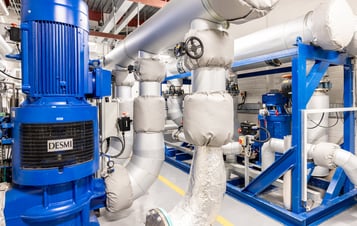| Source | Percentage |
| Gas | 74 |
| Electric | 9 |
| Oil | 3 |
| None | 1 |
| Other | 13 |
Source: House of Commons Library, Constituency data: Central heating, 2021 census

In 2019, the UK became the world's first major economy to pledge to hit net zero greenhouse gas emissions by 2050.
In order to meet this ambitious pledge, we need to completely rethink how our society functions, including how we heat our homes.
Heating buildings accounted for approximately 33 percent of the UK's CO2 emissions in 2018, so the UK will not meet its climate change targets without a revolution in heating.
Video player requires marketing cookies.
To view this content please click here to allow marketing cookies.
While reducing emissions to zero may seem like a difficult and perhaps daunting challenge, it also presents an opportunity to re-imagine our society and put in place systems that are fit for the future.
If we get this right, we have a chance to leave behind a legacy that future generations can be proud of. But we have to be prepared to think big.
Our societies have been completely transformed by technology since the industrial revolution, but the burning of fossil fuels to heat our homes has remained largely unchanged for thousands of years.
Homes being built today are taking advantage of many cutting-edge technologies, from the use of facial recognition software to access the home, to deliveries via drones. Heating can now be controlled through your smartphone, and yet this heat is still provided by burning fossil fuels in our boilers - not very different from the methods of our stone age ancestors.
| Source | Percentage |
| Gas | 74 |
| Electric | 9 |
| Oil | 3 |
| None | 1 |
| Other | 13 |
Source: House of Commons Library, Constituency data: Central heating, 2021 census
According to 2021 census data, 74 percent of UK homes are currently heated by burning natural gas. The process of its extraction, transportation, and combustion to heat homes is a major contributor to air pollution. In addition, gas can be dangerous with a risk of explosions both in the home and in gas storage facilities, which are often located in residential areas.

Heating your home can be expensive, and the price of fossil fuels, much like natural gas, can be volatile, and easily disrupted by geopolitical power struggles, market fluctuations and regional conflict.
Fossil fuels are also finite, and we must prepare for a future without them.
In practice, this means switching to a heating system that does not rely on any one specific fuel source, and building homes that will not need to be continuously retrofitted with new heating systems depending on which fuel is available at the time.
Making the right decisions about heating now will deliver safe, reliable, and affordable systems for future generations.
Heat, however, is more complex than other energy sectors. The right approach to heating will depend on the location, technology and the characteristics of the individual building.

Most UK homes are heated using natural gas boilers, but there are far more resource-effici...

UK homes are being encouraged to move to low carbon heating, but what are the benefits?

A heat network, also referred to as district heating, is a system of delivering heat to ho...

Heat networks are used in many parts of the world to deliver low carbon heat to homes and ...